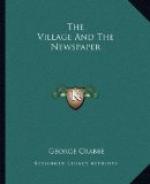The guard and glory of the trees below;
Till on its head the fiery bolt descends,
And o’er the plain the shattered trunk extends;
Yet then it lies, all wond’rous as before,
And still the glory, though the guard no more:
So thou, when every virtue, every grace,
Rose in thy soul, or shone within thy face;
When, though the son of Granby, thou wert known
Less by thy father’s glory than thy own;
When Honour loved and gave thee every charm,
Fire to thy eye and vigour to thy arm;
Then from our lofty hopes and longing eyes,
Fate and thy virtues call’d thee to the skies;
Yet still we wonder at thy tow’ring fame,
And, losing thee, still dwell upon thy name.
Oh! ever honour’d, ever valued! say,
What verse can praise thee, or what work repay?
Yet verse (in all we can) thy worth repays,
Nor trusts the tardy zeal of future days: —
Honours for thee thy country shall prepare,
Thee in their hearts, the good, the brave shall bear;
To deeds like thine shall noblest chiefs aspire,
The Muse shall mourn thee, and the world admire.
In future times, when smit with Glory’s charms,
The untried youth first quits a father’s arms; —
“Oh! be like him,” the weeping sire shall say;
“Like Manners walk, who walk’d in Honour’s way;
In danger foremost, yet in death sedate,
Oh! be like him in all things, but his fate!”
If for that fate such public tears be shed,
That Victory seems to die now thou art dead;
How shall a friend his nearer hope resign,
That friend a brother, and whose soul was thine?
By what bold lines shall we his grief express,
Or by what soothing numbers make it less?
’Tis not, I know, the chiming of a song,
Nor all the powers that to the Muse belong,
Words aptly cull’d, and meaning well express’d,
Can calm the sorrows of a wounded breast;
But Virtue, soother of the fiercest pains,
Shall heal that bosom, Rutland, where she reigns.
Yet hard the task to heal the bleeding heart,
To bid the still-recurring thoughts depart,
Tame the fierce grief and stem the rising sigh,
And curb rebellious passion, with reply;
Calmly to dwell on all that pleased before,
And yet to know that all shall please no more; —
Oh! glorious labour of the soul, to save
Her captive powers, and bravely mourn the brave.
To such these thoughts will lasting comfort give —
Life is not measured by the time we live:
’Tis not an even course of threescore years, —
A life of narrow views and paltry fears,
Gray hairs and wrinkles, and the cares they bring,
That take from Death the terrors or the sting;
But ’tis the gen’rous spirit, mounting high
Above the world, that native of the sky;
The noble spirit, that, in dangers brave
Calmly looks on, or looks beyond the grave: —
Such Manners was, so he resign’d his breath,
Till on its head the fiery bolt descends,
And o’er the plain the shattered trunk extends;
Yet then it lies, all wond’rous as before,
And still the glory, though the guard no more:
So thou, when every virtue, every grace,
Rose in thy soul, or shone within thy face;
When, though the son of Granby, thou wert known
Less by thy father’s glory than thy own;
When Honour loved and gave thee every charm,
Fire to thy eye and vigour to thy arm;
Then from our lofty hopes and longing eyes,
Fate and thy virtues call’d thee to the skies;
Yet still we wonder at thy tow’ring fame,
And, losing thee, still dwell upon thy name.
Oh! ever honour’d, ever valued! say,
What verse can praise thee, or what work repay?
Yet verse (in all we can) thy worth repays,
Nor trusts the tardy zeal of future days: —
Honours for thee thy country shall prepare,
Thee in their hearts, the good, the brave shall bear;
To deeds like thine shall noblest chiefs aspire,
The Muse shall mourn thee, and the world admire.
In future times, when smit with Glory’s charms,
The untried youth first quits a father’s arms; —
“Oh! be like him,” the weeping sire shall say;
“Like Manners walk, who walk’d in Honour’s way;
In danger foremost, yet in death sedate,
Oh! be like him in all things, but his fate!”
If for that fate such public tears be shed,
That Victory seems to die now thou art dead;
How shall a friend his nearer hope resign,
That friend a brother, and whose soul was thine?
By what bold lines shall we his grief express,
Or by what soothing numbers make it less?
’Tis not, I know, the chiming of a song,
Nor all the powers that to the Muse belong,
Words aptly cull’d, and meaning well express’d,
Can calm the sorrows of a wounded breast;
But Virtue, soother of the fiercest pains,
Shall heal that bosom, Rutland, where she reigns.
Yet hard the task to heal the bleeding heart,
To bid the still-recurring thoughts depart,
Tame the fierce grief and stem the rising sigh,
And curb rebellious passion, with reply;
Calmly to dwell on all that pleased before,
And yet to know that all shall please no more; —
Oh! glorious labour of the soul, to save
Her captive powers, and bravely mourn the brave.
To such these thoughts will lasting comfort give —
Life is not measured by the time we live:
’Tis not an even course of threescore years, —
A life of narrow views and paltry fears,
Gray hairs and wrinkles, and the cares they bring,
That take from Death the terrors or the sting;
But ’tis the gen’rous spirit, mounting high
Above the world, that native of the sky;
The noble spirit, that, in dangers brave
Calmly looks on, or looks beyond the grave: —
Such Manners was, so he resign’d his breath,




